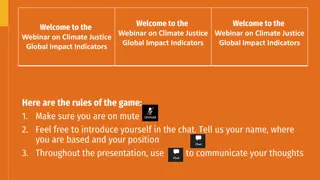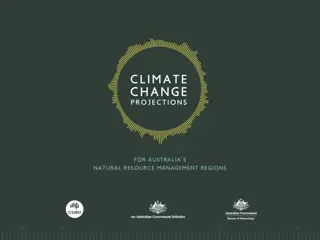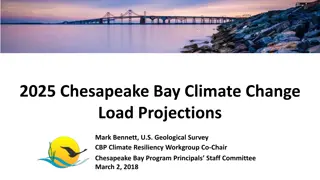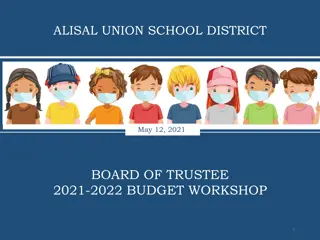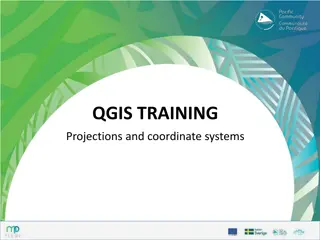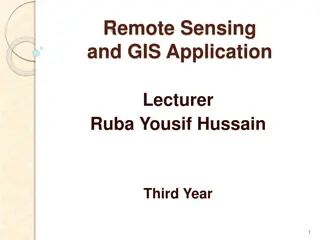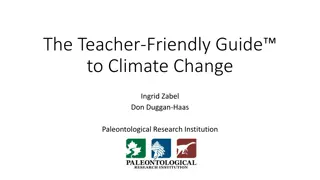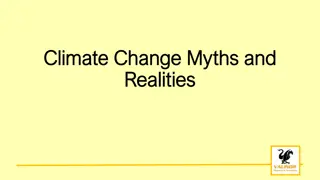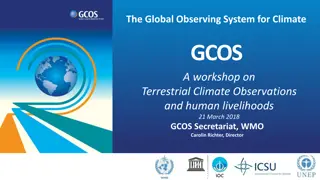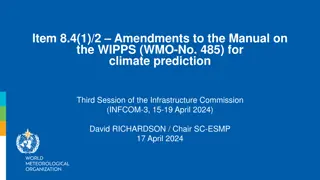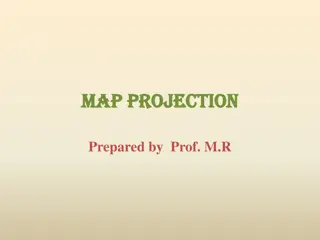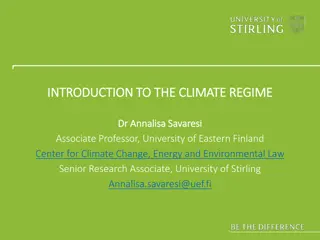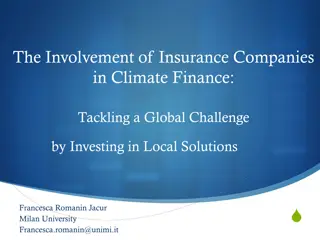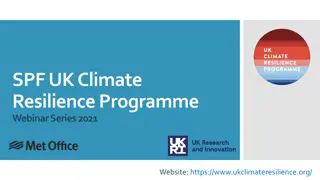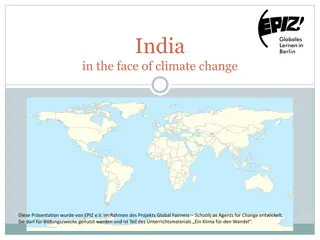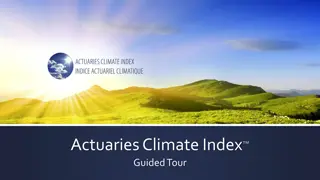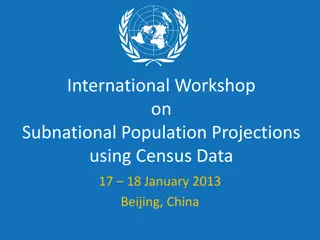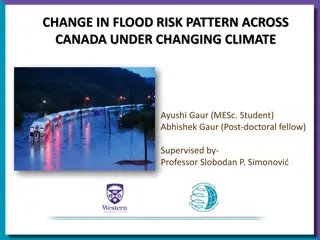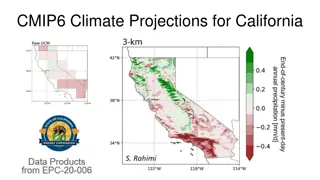Understanding Climate Change: Weather vs. Climate, Kppen-Geiger Classification, and Major Climate Zones
Explore the distinctions between weather and climate, delve into the Kppen-Geiger Climate Classification System, and discover major climate categories such as tropical climates. Gain insights into climate change and its impact on our environment.
8 views • 11 slides
National Climate Change Bill Overview
The National Climate Change Bill aims to establish an effective response to climate change in South Africa, promoting a transition to a low-carbon, climate-resilient economy. It focuses on coordinated actions, adaptive capacity enhancement, greenhouse gas management, and a fair global contribution.
8 views • 21 slides
Climate Change Impacts and Projections in Western Cape Directorate 2023
Climate Change presentation highlights real impacts such as sea level rise, increased fire risks, and projected scenarios like extreme temperatures, droughts, and greenhouse gas emissions in the Western Cape. Projections indicate significant challenges ahead, urging action towards adaptation and mit
1 views • 23 slides
Regional Climate Modeling in CORDEX South Asia for Climate Change Research
This information details the regional climate modeling efforts within the CORDEX South Asia framework, focusing on high-resolution dynamical downscaling of CMIP5 climate projections. It highlights the activities, opportunities, and challenges for assessing regional climate change, along with future
4 views • 11 slides
Investment Responses to Biophysical Climate Impacts on Water, Energy, and Land in SDGs and Climate Policies
Investment assessments using Integrated Assessment Models (IAMs) are evolving to include biophysical climate impacts, assessing climate uncertainty on investments. The approach involves the MESSAGEix-GLOBIOM IAM, considering climate policy, SDG measures, and impacts under different scenarios. Climat
6 views • 32 slides
Tracking Progress of Mitigation Commitments and Greenhouse Gas Emissions Projections
Explore the journey of tracking progress on mitigation commitments, projections of greenhouse gas emissions, and scenarios for future projections. Learn about the importance of developing projections, quality control, and reporting scenarios for various policy measures. Discover tools available for
0 views • 19 slides
Gender-based Climate Change Litigation: A Key Solution?
Gender-based climate change litigation is emerging as a potential solution to address the disproportionate impact of climate change on different genders. Various international bodies have recognized the importance of integrating a gender-responsive approach in climate action to uphold human rights,
4 views • 12 slides
Gender and Climate Change in Agriculture: Impacts and Adaptation Strategies
This workshop explores the intersection of gender and climate change in agriculture, emphasizing the importance of considering gender dynamics in adaptation planning. It covers the effects of climate change on men and women in agriculture, reasons for gender-sensitive adaptation planning, global and
0 views • 10 slides
Regional Project Proposal to Enhance Climate Resilience in Pakistan, Mongolia, and PRC
This proposal outlines a regional project focusing on enhancing climate resilience and agricultural productivity in Pakistan, Mongolia, and the People's Republic of China (PRC). The project aims to increase access to credit for smallholder farmers, promote climate-smart agriculture technologies, and
0 views • 12 slides
Socio-Economic Projections for Kigali City: 2013 Master Plan Update
The IPAR Research Conference held on 19th June 2019 and presented by Brian Kiberu showcased the socio-economic projections for Kigali City from 2018 to 2050 as per the 2013 Kigali Master Plan update. The research covered population dynamics, labor market characteristics, GDP growth, economic activit
1 views • 37 slides
Climate Change Monitoring, Reporting, and Verification (MRV) Training Session Overview
This document outlines the purpose and reporting requirements for the development of a Climate Change Monitoring, Reporting, and Verification (MRV) system, focusing on projections and scenarios. It highlights the importance of collecting information for climate mitigation, assisting Serbia in meetin
0 views • 19 slides
Personal Rights in European Climate Litigation
Climate litigation in Europe focuses on individual rights and the shortcomings of traditional governance mechanisms in addressing climate change. The emergence of climate litigation as a crucial tool in governance is driven by the need to protect individuals and specific groups who are disproportion
0 views • 17 slides
Analyzing Systemic Climate Risk in the Financial Sector
This study discusses systemic climate risk in the financial sector by examining the effects of climate risks on financial institutions. It aims to design a market-based framework to assess the vulnerability of financial institutions to climate risks and analyze potential contagion effects. The frame
0 views • 39 slides
Climate Justice Global Impact Indicators Webinar - June 2023
Explore the Climate Justice Theory of Change, key definitions, impact indicators, and the importance of climate-relevant decision-making in this informative webinar. Gain insights on climate adaptation, resilience, and the effects of climate change, all aimed at empowering marginalized communities t
0 views • 27 slides
Understanding Climate Projections for Impact Assessment
The Climate Futures Framework provides insights into using climate projections for impact assessments, emphasizing the importance of tailoring projections to specific objectives. Typical climate projections involve central tendencies and uncertainty ranges, but assessing multiple variables jointly r
0 views • 24 slides
Chesapeake Bay Climate Change Load Projections for 2025
The document discusses climate change projections for the Chesapeake Bay in 2025, focusing on factors like sea level rise, temperature increase, and precipitation change. It outlines proposed policy decisions, addressing uncertainties in climate change impacts on water quality and the need to incorp
0 views • 22 slides
Alisal Union School District 2021-2022 Budget Workshop Overview
The Alisal Union School District held a budget workshop to review revenue projections, expenditure projections, enrollment and staffing projections, additional federal and state funding, and supplemental and concentration expenditures. The workshop highlighted revenue sources, including local contro
2 views • 26 slides
National Priorities for Climate Change Science and Knowledge in Canada
Canadians are experiencing firsthand the impacts of climate change, including wildfires, heatwaves, floods, hurricanes, and droughts. To address these challenges, foundational climate change science and knowledge are essential for understanding our changing environment, identifying impacts, making i
0 views • 9 slides
Dynamic Microsimulation Projection Tool for Developing Countries
The DYNAMIS project, funded by the World Bank, aims to demonstrate the feasibility of dynamic microsimulation for population projections in developing countries. This portable platform offers highly disaggregated population projections and serves as a core component for simulating social development
0 views • 24 slides
Understanding Map Projections and Coordinate Systems in QGIS
Map projections are essential for representing the Earth's surface on a flat plane, with various distortions depending on the projection used. QGIS provides tools to work with different projections like UTM, Lambert Azimuthal Equal Area, and more. Mixing projections in QGIS can lead to errors in dat
0 views • 13 slides
Understanding Coordinate Systems, Map Projections, and GIS Applications
Explore the intricacies of Geographic Coordinate Systems, Projected Coordinate Systems, and different types of map projections as part of the Remote Sensing and GIS Application course taught by Lecturer Ruba Yousif Hussain in the third year. Dive into the properties of map projections like conforman
0 views • 13 slides
Understanding Climate and Its Impact on Earth
Exploring the fundamentals of climate, this comprehensive guide covers topics such as climate zones, climate formation, atmospheric composition, the role of CO2, ocean heat absorption, and circulation patterns. From the basics of weather and seasons to the significant impact of climate change, learn
0 views • 12 slides
The Teacher-Friendly Guide to Climate Change
The Teacher-Friendly Guide to Climate Change authored by Ingrid Zabel, Don Duggan-Haas, Robert Ross, and others explores topics such as climate measurement, natural causes of climate change, historical climate perspectives, and more. It delves into the significance of understanding past climates to
1 views • 12 slides
Climate Future Discussion: Global Warming and Future Projections
The climate discussion presents images and text highlighting rising GHG concentrations, global temperature history, and IPCC projections for the future. It emphasizes the urgent need for action to combat climate change and mitigate its effects in the coming years.
0 views • 63 slides
Climate Change Myths and Realities: Debunking Common Misconceptions
This content discusses common myths surrounding climate change and provides evidence-backed realities to debunk them. Topics include the pause in warming, natural climate variability, misconceptions about climate models, the impact of CO2 on plant life, and the consensus among climate scientists. Th
0 views • 6 slides
The Global Observing System for Climate and Terrestrial Climate Observations
The Global Observing System for Climate (GCOS) plays a crucial role in observing climate-related variables globally. Established in April 1992, GCOS focuses on what, how, and where to measure, sustain measurement, manage change, data transmission, management, rescue, and access. It addresses concern
0 views • 17 slides
Amendments to WIPPS Manual for Climate Prediction at INFCOM-3, April 2024
The document discusses amendments to the Manual on WIPPS for climate prediction, including new recommendations for weather, climate, water, and environmental prediction activities. It introduces concepts such as Global Climate Reanalysis and the coordination of multi-model ensembles for sub-seasonal
0 views • 10 slides
Understanding Map Projections: Types and Techniques
Explore the world of map projections with a focus on classification based on construction methods and developable surfaces. Learn about perspective, non-perspective, and conventional projections, as well as cylindrical, conical, and zenithal projections. Delve into how different surfaces interact wi
0 views • 14 slides
Climate Change Litigation in Aotearoa/New Zealand: LCANZI Action and Judicial Review
The Lawyers for Climate Action NZ Incorporated (LCANZI) are actively involved in climate change litigation in Aotearoa/New Zealand, including challenging government decisions related to climate responses. A notable case involved a judicial review against Auckland Transport, where the High Court refu
0 views • 6 slides
Insights into General Use Projections for Climate Analysis
Explore the significance of General Use Projections in climate research, understanding their role in capturing future projections effectively. Learn about considerations for selecting these projections, key metrics to focus on, and guidelines for incorporating a diverse range of models. Discover pro
0 views • 21 slides
Understanding Weather and Climate Factors
Weather and climate are essential aspects of understanding the Earth's atmosphere. Weather refers to short-term atmospheric conditions, while climate represents long-term averages over 30 years. Factors influencing climate include distance from the equator, altitude, proximity to the sea, wind direc
0 views • 10 slides
Understanding the International Climate Regime and Governance
In this comprehensive overview, Dr. Annalisa Savaresi delves into the intricacies of the international climate regime, highlighting key aspects such as international climate law, major climate conferences like COP26, and the evolution of climate governance. The discussion covers important agreements
0 views • 27 slides
The Role of Insurance Companies in Climate Finance: Addressing Global Challenges through Local Investments
Exploring the engagement of insurance companies in climate finance, this presentation highlights the significance of private sector involvement in tackling climate change at a local level. It delves into key concepts such as mitigation, adaptation, and the global scientific targets for combating cli
0 views • 11 slides
UK Climate Resilience Programme Webinar Series 2021
The UK Climate Resilience Programme is hosting a webinar series featuring experts discussing climate resilience, adaptation strategies, and socio-economic pathways for the UK. Attendees can engage in presentations, Q&A sessions, and access recorded content post-event. Learn about the latest developm
0 views • 10 slides
India in the Face of Climate Change: Historical Background, Consequences, and Projections
India, a country with a rich historical and political background, faces significant consequences of climate change, impacting its monsoon seasons and rural population. This presentation explores historical roots, current challenges, and future projections, emphasizing India's position in climate neg
0 views • 11 slides
Understanding the Actuaries Climate Index: A Comprehensive Guide
The Actuaries Climate Index (ACI) is an essential tool that measures climate risks using historical data collected since 1961. It focuses on extreme climate events and sea level changes, providing valuable insights into the impacts of climate change. By analyzing the ACI and its components, users ca
0 views • 18 slides
Subnational Population Projections Workshop Highlights
The International Workshop on Subnational Population Projections discussed methods for preparing subnational projections using a bottom-up approach and integrating them into national projections. The session also covered the use of Spectrum software to generate subnational projections and steps invo
0 views • 35 slides
Analyzing Flood Risk Pattern Changes in Canada Under Climate Shift
The study delves into the evolving flood risk patterns across Canada amidst a changing climate scenario. By employing advanced models and methodologies, the research aims to project future flood occurrences and assess the associated risks. Through meticulous data collection and analysis, the team is
0 views • 15 slides
Climate Projections and Data Evaluation for California
Detailed information on CMIP6 climate projections for California, evaluation of global climate models, summaries of data on the C-DAWG website, large set of CMIP6 downscaled climate projection data, and improvements in the LOCA2-Hybrid approach. The LOCA2-Hybrid method offers higher resolution train
0 views • 15 slides
Canadian Climate Change Policy from a Climate Ethics Perspective
Explore the ethical implications of Canadian climate change policy, delving into the necessity of meeting targets established in the Paris Agreement, the need for rapid decarbonization, and the availability of climate-safe energy alternatives. The presentation emphasizes the urgency of action to mit
0 views • 16 slides












